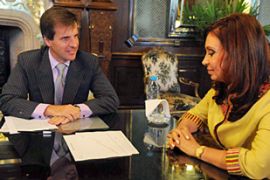Argentine bank chief resigns
Redrado resigned after his refusal of the president’s decree to spend foreign reserves.

‘Monetary stability’
He claimed credit for bringing Argentina monetary stability for the first time in 30 years, but said the Argentine president had disregarded this achievement while unconstitutionally ordering his removal.
“I’ve left the Central Bank with a better institutional reputation, with an independent criteria, a Central Bank that gives Argentines the peace of mind that they’ve had during these years,” Redrado told the news conference.
| FROM THE BLOGS | |||
|
Pesce, an economist who is seen as close to the government, took charge of the bank last week after another court ruled that Congress should have a say on Redrado’s firing.
The ruling said the government could not appoint a new permanent director until a congressional commission had issued its opinion, which Fernandez’s administration interpreted as meaning they could appoint an interim chief.
The same court upheld a freeze on the government plan to create a fund with the country’s dollar reserves, but Fernandez could still try to win support for the plan in Congress.
Police barred Redrado from entering the bank’s premises on Sunday and even opposition MPs said it was time for him to step aside.
The turmoil at the monetary authority has rattled financial markets in Latin America’s third-largest economy just as the cash-strapped government seeks to woo investors by offering to swap $20bn in defaulted sovereign bonds.
Government ministers have said repeatedly that the swap is on track and economic analysts expect it to launch in the coming weeks.
Tension
Redrado’s departure, coupled with the recommendations from the special congressional committee, should ease political tensions and allow the government to focus on the debt exchange, seen as a key step in Argentina’s drive to return to global credit markets eight years after a massive default.
The commission has been meeting this week, but any recommendations will be non-binding and Pesce has been at the helm of the Central Bank in the meantime.
Anibal Fernandez, the cabinet chief, said President Fernandez would not accept Redrado’s resignation until the congressional commission gives its verdict on the issue next week.
“The congressional commission is going to publish its recommendation on Tuesday and once we have that the president will make the decision that she has to make. There’s no resignation as far as we’re concerned,” he said.
